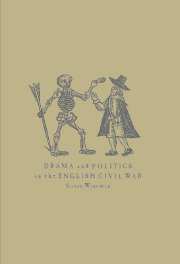Book contents
- Frontmatter
- Contents
- List of illustrations
- A note on texts and list of abbreviations
- Acknowledgements
- Preface
- Introduction: how the drama disappeared
- PART I 1642–1649: CASES IN POLITICS AND DRAMA
- Interchapter: ‘The life of action’: playing, action and discourse on performance in the 1640s
- PART II THE 1650S: PROTECTORATE, POLITICS AND PERFORMANCE
- Coda
- Notes
- Select bibliography
- Index
Introduction: how the drama disappeared
Published online by Cambridge University Press: 20 August 2009
- Frontmatter
- Contents
- List of illustrations
- A note on texts and list of abbreviations
- Acknowledgements
- Preface
- Introduction: how the drama disappeared
- PART I 1642–1649: CASES IN POLITICS AND DRAMA
- Interchapter: ‘The life of action’: playing, action and discourse on performance in the 1640s
- PART II THE 1650S: PROTECTORATE, POLITICS AND PERFORMANCE
- Coda
- Notes
- Select bibliography
- Index
Summary
‘STAGE PLAYES’ AND 1642
Whereas the distress and Estate of Ireland, steeped in her own Blood, and the distracted Estate of England, threatened with a Cloud of Blood by a Civill War, call for all possible Means to appease and avert the Wrath of God, appearing in these Judgements; among which, Fasting and Prayer have been tried to be very effectual … and are still enjoyned; and whereas Publike Sports do not well agree with Publike Calamities, nor Publike Stage-playes with the Seasons of Humiliation, this being an Exercise of sad and pious solemnity, and the other being Spectacles of Pleasure, too commonly expressing lascivious Mirth, and Levitie it is therefore thought fit, and Ordained, by the Lords and Commons in this Parliament Assembled, that while these sad Causes and set times of Humiliation doe continue, publike Stage-playes shall cease and be forborne, instead of which are recommended to the People of this land the profitable and seasonable considerations of Repentance, Reconciliation and Peace with God, which probably may produce outward Peace and Prosperity, and bring again Times of Joy and Gladness to these Nations.
This is the order which closed the playhouses on 2 September 1642. In an investigation of the relationship between drama and its political situations during the period 1642–1660, when the London theatres were – for the most part – closed, much depends on how we decide to interpret this document.
- Type
- Chapter
- Information
- Drama and Politics in the English Civil War , pp. 1 - 16Publisher: Cambridge University PressPrint publication year: 1998



